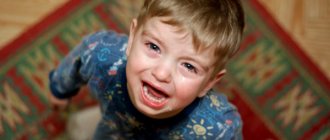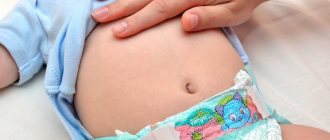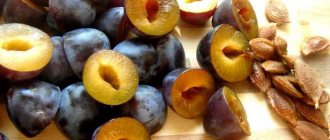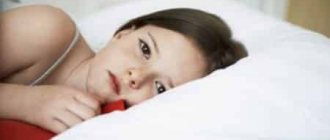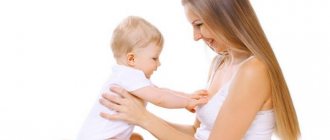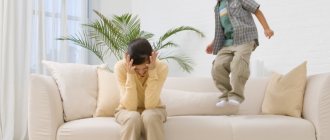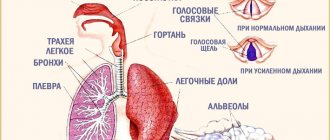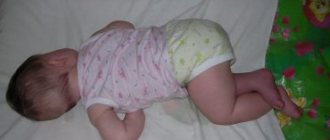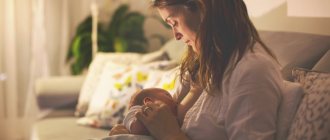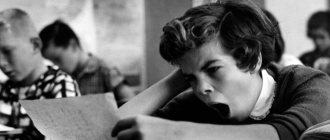- Causes
- Symptoms
- Age characteristics
- Diagnostics
- What to do?
- Consequences
- Prevention
Sneezing is an unconditioned reflex of the human body, occurring as a reaction to some irritants that have entered the nasal passage. If this is a one-time, non-repetitive process, there is nothing to worry about.
But what to do if the child sneezes a lot and often? Is this a symptom of some disease that can be prevented or at least treated in time? Yes, in such cases it is necessary to take a closer look at the baby to identify accompanying signs. If they exist, urgent measures need to be taken.
Age characteristics
If a child constantly sneezes, you need to take into account his age characteristics.
They will help to establish the true cause of this phenomenon and take appropriate measures. Young parents have probably noticed that a newborn baby often sneezes - this causes a terrible panic attack in some. People begin visiting hospitals, using traditional methods of treating colds, etc.
https://www.youtube.com/watch{q}v=
As a rule, a breastfeeding baby often sneezes during feeding due to an unformed eustachian tube or due to the accumulation of postpartum mucus in the nasopharynx.
Parents also often ask whether a child can sneeze when teething. The very process of their appearance cannot cause such a reflex. But it greatly weakens the immune system, which is why the baby often gets sick. And this is where snot, coughing and sneezing come into play.
If a child is prone to allergies, they will begin to appear at the first contact with an irritant. One of the main symptoms is that the child begins to sneeze uncontrollably many times in a row.
As soon as the allergen (fragrance, citrus fruits, wool, dust, etc.) stops affecting the respiratory tract, the process will stop. For the first time this happens just in preschool age.
Among school-age children, the most common cause of frequent and uncontrollable sneezing is infections and viruses that they pick up at school and on public transport.
The children's group is their real breeding ground. If this is accompanied by a cough and runny nose, the child should be promptly isolated before he infects anyone else and treated.
During puberty, a child may sneeze due to allergies, which worsen during adolescence. In this case, parents should always have antihistamines in their medicine cabinet and avoid contact with an irritant that is probably already known at this point in time.
However, in some cases, neither accompanying symptoms nor age-related characteristics help to understand the root cause why the child sneezes a lot and often. Then the help of doctors cannot be avoided. They will need to conduct a diagnosis in order to prescribe treatment.
Young parents have probably noticed that a newborn baby often sneezes - this causes a terrible panic attack in some. People begin visiting hospitals, using traditional methods of treating colds, etc.
Symptoms
As soon as you notice that your child is sneezing too much and often, take a closer look to see if there are any other abnormalities in his condition. Additional symptoms make it possible to recognize the cause of the phenomenon in time.
If a child sneezes and clear snot flows, this is a symptom of an incipient cold. The sooner you begin to treat it, the milder it will go and the faster the recovery will come. If you have an allergy, sneezing will be accompanied by nasal congestion, but there will be no discharge.
But if a child sneezes and scratches his eyes, this is a sign of an allergic reaction. The irritating substance enters not only the nasal passage, but also the mucous membrane of the eyes. Because of this, they begin to itch, water, and there is severe redness. There is no sneezing with conjunctivitis.
If your baby sneezes and scratches his nose, there is hardly any need to worry: most likely, he just got something small - a feather, a speck of dust. They caused tickling, which provoked this behavior. This goes away within an hour. The main thing is that small objects do not get into the respiratory tract.
If a child sneezes and coughs, this is no longer the initial stage of a cold. This indicates that the incubation period of the disease has passed and it has taken over the body. Here you will need to consult a doctor and complete course of treatment.
Diagnostics
If your child is sneezing non-stop, but there are no other signs of illness, it is best to start by visiting a therapist. He will conduct an initial diagnosis, and then may make a referral to an ENT or allergist if the cause of repeated sneezing is beyond his competence. What to expect at the diagnostic stage:
- examination of the nasal cavity and pharynx;
- general blood and urine tests for infections and viruses;
- bacterial inoculation of the contents of the mucous membranes is possible;
- tests to determine the allergen.
Diagnostics in such cases does not involve any scary laboratory tests. So if you are not sure of the reason why your child is sneezing non-stop, it is better to take him to the hospital and find out there.
When a child coughs and sneezes as a result of an infection
Flu and colds are very common causes of sneezing and coughing in children. Main symptoms include:
- Sneezing
- Cough
- Runny or stuffy nose
- A sore throat
- Fever
- Headache
- Muscle pain
- Feeling of pressure in the ears and face
- Weakness and loss of appetite
If yellow sputum is produced when you sneeze and cough, this indicates the presence of an infection in the body.
Consequences
If a child sneezes 3-4 times a day and not in a row, this is a good sign. The fact is that this reflex is given to the human body to free the nasal passages from microparticles, dust, dirt, and mucus accumulated there. This promotes better ventilation of the lungs.
But if the process is repeated and tiring for the baby, without timely measures taken it can have serious consequences:
- rhinitis;
- bronchial asthma;
- sinusitis;
- frontal sinusitis;
- polyps;
- scleromas.
Each of these diseases is quite severe and, in the absence of therapy, goes into a chronic stage with almost continuous treatment.
How to distinguish allergies from colds?
Sneezing with allergies does not lead to fever, yellow mucus, chills and other symptoms typical of colds and flu. Often, with allergies, a child's eyes may itch and produce clear, watery sputum.
But the main difference between sneezing with allergies and with a cold is the duration. Colds usually last no more than 2 weeks. Whereas sneezing due to allergies can last for several months, or until the allergen is found and eliminated.
Prevention
Repeated and frequent sneezing in a child can be prevented by timely preventive measures:
- Strengthen immunity.
- Temper yourself.
- Treat any disease to the end.
- Avoid contact with allergens.
- Ventilate the room.
- Do not keep heating devices on all the time.
- Provide walks in the fresh air.
Your child sneezes a lot and frequently{q} Don't take it too lightly. This may be a symptom of a serious disease - upcoming or already taking over the body.
Correct determination of the cause will allow you to correctly and timely prevent or cure the disease. Otherwise, the infection will quickly spread throughout the house. Be healthy!
Following these extremely simple recommendations will help prevent a runny nose and sneezing in the morning:
- Ventilate the room regularly before going to bed.
- Do wet cleaning at least twice a week.
- Use special air humidifiers or vessels with water to increase air humidity and create a favorable microclimate.
- Do not suppress sneezing as this may damage your eardrum.
- During the period of exacerbation of infectious and respiratory diseases, take vitamin-mineral complexes and immunostimulating drugs for preventive purposes, which help activate the body’s own defenses.
A runny nose in the morning is an alarming symptom that indicates the presence of certain health problems in the patient. Consultation with a qualified specialist will help identify provoking factors and develop the most effective therapeutic course!
Treatment methods
To eliminate sneezing in young children, Dr. Komarovsky recommends regularly cleaning the nasal passages from the accumulation of dry crusts that irritate the mucous membranes. This therapeutic and hygienic procedure is carried out using a small cotton swab treated with warm water. Such a flagellum is carefully, one by one, inserted into each nostril of the baby and rotated clockwise.
If a child starts sneezing, he or she can become seriously ill. If sneezing is a symptom of a viral, cold or infectious disease, you need to start with treatment of the underlying disease that provoked this manifestation.
Anti-cold, antipyretic, painkillers and even antibiotic medications may be recommended for your baby. Only a pediatrician should prescribe certain medications to a child, determine their optimal dosage and duration of the therapeutic course after a preliminary diagnosis!
A good therapeutic effect is obtained by rinsing the nose with saline solution, as well as drops of Nazol, Aquamaris, Nesopin. To treat colds and viral diseases, children are often prescribed the following medications:
- Suprax;
- Amoxilav;
- Flexid;
- Zinnat.
Immunomodulating drugs, as well as children's vitamin and mineral complexes, will help strengthen the immune system and activate the baby's own defenses.
If a young patient has allergic diseases, the doctor will prescribe antihistamines after identifying the provoking allergens. At the same time, in order to achieve extremely fast, favorable results of the treatment course, it is important to put the child on a hypoallergenic diet and limit his contact with allergens that provoke sneezing.
If a month-old baby sneezes without any alarming signs, then special treatment is not required in this case. If a baby's sneezing is accompanied by a physiological runny nose, then his condition can be alleviated by cleansing the nasal passages using nasal aspirators and regular nasal rinsing.
Nothing helped, and the baby continues to sneeze{q} Pay attention to possible symptoms
Repeated sneezing does not just happen. First you need to understand what contributes to this: a natural reaction of the body or a symptom of an incipient disease.
1. Cold.
2. Viral infection.
3. Allergic reaction.
4. Dry indoor air.
5. Bright light.
6. Very sudden temperature changes.
7. Newborns use a sneeze to clear the nasal passages of postpartum mucus.
8. An infant often sneezes during feeding due to an unformed eustachian tube. This provokes a slight tickling sensation, which provokes sneezing.
If you notice that your child is sneezing frequently during the day, try not to panic, but to calmly analyze the situation. It may be enough to ventilate and humidify the room, or simply go out into the fresh air.
1. Runny nose
If a child has a stuffy nose, but there is no snot, this is a sign of an allergic reaction. On the contrary, transparent sniffles in the company of sneezing indicate the onset of a cold.
2. Itching
The baby sneezes and scratches his nose - this means that a speck has entered the nose, which tickles and irritates the mucous membrane. Usually no help is needed here, everything will pass within a short time.
If a child scratches his eyes when sneezing, this is a sign of an allergic reaction. The allergen gets not only into the nasal passage, but also into the eyes, causing them to redden. It is worth noting that conjunctivitis is not accompanied by sneezing.
READ MORE: Child's nails are peeling
3. Cough
If sneezing is accompanied by a cough, this is a clear sign of a lingering cold. In such a situation, it is important to contact your pediatrician and begin a course of treatment.
Consultation with a qualified specialist is necessary for any manifestations of chronic morning rhinitis. However, if the following alarming symptoms appear, you should seek medical help immediately:
- Attacks of dizziness.
- General weakness, increased fatigue.
- Nausea.
- Attacks of vomiting.
- Development of shortness of breath.
- Severe joint pain.
- Feverish condition.
- Swelling of the mucous membranes, localized in the nose, eyes or oropharynx.
- Tachycardia.
Causes
First, it’s worth understanding why a child sneezes often: is this a natural reaction of the body or a sign of an ongoing disease? Pediatricians name the following most common causes of repeated sneezing:
- cleansing the nasopharynx of newborns from postpartum mucus, which accumulates in large quantities during intrauterine development of the fetus;
- the baby often sneezes due to the unformed eustachian tube, which connects the nasopharynx and ear: during feeding, he feels a slight tickling, which causes this reflex;
- respiratory viral infection;
- if a child most often sneezes in the morning after sleep, this is most likely an allergic reaction to various external irritants: pollen, citrus fruits, animal hair, dust, strong odors;
- sudden changes in air temperature;
- if a child sneezes in his sleep at night, most likely he reacts this way to the air in the room being too dry;
- bright light;
- cold.
If a child sneezes frequently and repeatedly during the day, parents should not ignore this fact. You need to try to understand what’s going on in order to take the necessary measures in time to avoid exacerbation of diseases and weakening of the body.
But this does not mean that you need to immediately run to the doctors and treat the baby with medications. Symptoms accompanying sneezing will help you understand what is happening.
Linguistic educational program. The sound of a sneeze is very similar in different languages of the world. Russian - "apchhi", English - "achoo", French - "atchoum", German - "hatschie", Spanish - "achu", Italian - "etchiu", Polish - "apsik", Japanese - "hakushon", Finnish - "atsiuh".
Treatment of allergic morning runny nose
Allergies can be caused by any substance except distilled water. In children, allergies arise from poor living conditions and heredity. If one of the parents suffers from allergies, then the child’s chance of getting sick is about 30%.
The most common causes of the disease are food, medications, house and book dust, animal hair and bird feathers, and plant pollen.
When a sick child comes into contact with potential allergens, he or she begins to feel unwell. He becomes easily excitable and whiny. Allergy attacks in young children worsen at night and are accompanied by heavy breathing and coughing.
In children from 1 to 7 years old, runny nose and cough are obvious signs of an incipient allergy. It all starts with itching in the nose, sneezing and a peculiar nasal discharge.
Cough occurs due to inflammation of the mucous membrane. The resulting itching forces the child to rub, scratch his nose and sneeze repeatedly. Allergic sneezing in bursts at night can have very serious consequences.
Difficulty breathing through the nose does not allow the child to get a good night's sleep and rest, after which frequent headaches appear, well-being, attention and memory deteriorate.
Allergic sneezing at night can be the result of close contact with allergens, for example, lint in the pillow or bed mites living in the bed.
Following simple rules will protect your children from allergies or reduce their manifestations. You should: - do wet cleaning of the apartment daily; — it is advisable to store books in glass cabinets;
— wash soft toys more often; — replace down and wool pillows and blankets with foam rubber or padding polyester; - do not have cats or dogs with long hair;
- be examined annually by an allergist for timely detection of the disease.
Allergies in children can be successfully treated with medications, but among other things, constant monitoring by a doctor and your care, patience and love are needed.
How to treat sneezing in a child is something all parents should know. This will help improve the baby’s well-being, as well as speed up the healing process.
Observe the following conditions:
- Ventilate the room where the child is and sleeps more often;
- Carry out wet cleaning regularly;
- Be sure to walk with your baby in the fresh air at least twice a day;
- Ensure your baby takes a complex of vitamins in the off-season;
- Drink plenty of warm drinks.
Category:Children's health
Before starting treatment, it is necessary to diagnose and find out the cause of the runny nose. You need to contact an otolaryngologist.
Diagnostic procedures for identifying a runny nose:
- Nasal rhinoscopy.
- Palpation of lymph nodes.
- X-ray of the sinuses.
- Skin allergy tests.
- Nasopharyngeal swab for laboratory testing.
After identifying the cause of a runny nose, the doctor prescribes therapy to get rid of the disease. How to treat a runny nose and sneezing in the morning without fever in an adult with allergies{q}
To get rid of allergic rhinitis, it is necessary to eliminate the irritant. Rinse your nose with a special saline or saline solution. Take antihistamines, which can relieve negative symptoms in a short period of time. Apply vasoconstrictor drops to reduce swelling.
An infectious runny nose requires constant rinsing of the nose with medications or saline solution made from salt water. It is also recommended to use drops with sea water.
The use of antiviral agents and antibacterial drops is indicated. During treatment, the patient needs to drink a lot of fluid; an excellent option is bottled still water, rosehip decoction, dried fruit compote, green tea, and so on.
If the cause of a runny nose is adenoiditis, sinusitis, or the formation of polyps, the tactics are selected depending on the size of the lesion and the personal characteristics of the body.
In the event that a runny nose upon awakening is provoked by the manifestation of allergic reactions, first of all, it is necessary to take care of eliminating the provoking factor - the allergen.
After conducting special allergy tests, the doctor prescribes the patient a therapeutic course using antihistamine medications.
In particularly complex clinical cases, hormonal therapy may be required. For a runny nose and sneezing, patients are prescribed nasal sprays and hormonal aerosols.
In addition, it is important to take care to create extremely favorable conditions for the patient during night sleep. To achieve these goals, medical experts advise using the following recommendations:
- Wash and rinse the laundry thoroughly, using detergents without fragrances or allergenic components.
- It is obligatory to take a shower before going to bed and change clean underwear.
- Carry out regular wet cleaning of the room to avoid dust accumulation.
- During the flowering period of plants that can provoke the development of allergic reactions, close the window at night, ventilating the room before going to bed.
- In the summer, before going to bed, it is recommended to curtain the windows with a damp gauze cloth, which will protect the room from the penetration of dust and allergenic pollen.
If attacks of allergic rhinitis are seasonal, care should be taken in advance to prevent the manifestation of allergic symptoms.
A runny nose and sneezing attacks in the morning can be a manifestation of diseases of a viral, infectious, cold or respiratory origin.
Treatment in this case includes drug therapy. Depending on the condition and form of the disease, patients are prescribed painkillers, antiviral, anti-inflammatory, and antipyretic drugs.
A good therapeutic effect is obtained by rinsing the nose with soda or saline solution. To carry out this therapeutic procedure, both special nasal aspirators and an ordinary small rubber bulb are used.
READ MORE: The child has a temperature of 38 and constipation
The best results are obtained by rinsing the nasal cavity with a saline solution, which is characterized by the presence of disinfectant and anti-inflammatory properties, as well as helping to restore the normal functional state of the nasal mucous membranes.
For colds, you can also use steam inhalation. To carry out this physiotherapeutic procedure, hot boiled potatoes, mint and eucalyptus essential oils, decoctions of sage and chamomile are used.
If you sneeze intensely, you can rinse your nasal cavity using the following means:
- Furacilin.
- Potassium permanganate.
- Freshly squeezed berry juice.
- Herbal infusion.
Rinsing will help eliminate swelling and inflammatory processes, clear the cavity from accumulation of mucus and pathogens that provoke sneezing.
Table of contents
The physiological function of sneezing as a protective unconditioned reflex is to remove foreign particles (such as mucus or dust) from the respiratory tract. The act of sneezing itself is a forced, sharp exhalation through the nasopharynx, carried out after a deep short inhalation. It differs from a cough in that when sneezing, the tongue is pressed against the palate, and a sharp exhalation occurs through the nose.
The act of sneezing is carried out as follows: a person feels an itching in the nose, which precedes the appearance of the sneezing reflex, inhales deeply, filling the lungs with air;
Then the intercostal, diaphragmatic, and abdominal muscles contract. The muscles of the larynx contract last, causing the glottis to close. All these reflex actions ultimately lead to the formation of increased intra-abdominal and intrathoracic pressure. After this, the air is vigorously exhaled. The speed of exhaled air passing at the level of the glottis can reach 50–100 meters per second, and its pressure is 100 mm Hg. Droplets of saliva and mucus from the nasal and oral cavities enter the air flow. Due to the forced movement of air, these droplets spread over a distance of 3 - 5 meters. The sneeze reflex occurs when the mucous membrane lining the nasal cavity is irritated. The causes of this irritation may be fluff, dust, pet hair (so-called “dust agents”); mold, pollen, dead skin particles (allergens).
Another type of irritant that affects the mucous membrane of the nasopharynx and nose is volatile substances (perfume aromas, cigarette smoke).
The appearance of a sneezing reflex can be triggered by a sharp change in temperature (for example, when a person leaves a warm room to go outside at sub-zero temperatures);
Sneezing is often a symptom of allergic and acute respiratory viral diseases.
Pregnant women complain of sneezing and difficulty breathing just before giving birth. Their nasal mucosa swells; health worsens.
With a pathology such as bulbar palsy, the sneezing reflex may be impaired.
The sneeze reflex is a protective mechanism that helps remove foreign particles from the respiratory tract. But there is a flip side, a negative side to this phenomenon: if sneezing occurs as a symptom of diseases transmitted by airborne droplets, then along with the sneeze the infection spreads further and reaches healthy people, infecting them. It's interesting that:
- In completely different cultures, it is customary to wish health to someone who sneezes.
- There is an old superstition that says that if a person sneezes during a conversation, then what he said is true.
There are many signs associated with sneezing. For example, it is believed that if a sailor, while loading luggage onto a ship, sneezes while standing on the starboard side, then his voyage will turn out to be a success, and if near the left side, then a storm will overtake him on the way. Another sign, found mainly in East Anglia, is that if you sneeze early in the morning, you can receive an unexpected gift before the end of the week.
What to do?
What should you do if your child starts sneezing repeatedly and uncontrollably? Is it possible to somehow stop this endless flow of “apchha”? The actions of parents will largely depend on the root cause of this phenomenon.
For a cold
If a child begins to sneeze frequently and this is accompanied by a runny nose, in 75% of cases this is the initial stage of a cold. Parents need to know what to do to prevent him from getting sicker and to stop the infection or virus at the very beginning.
- Steam baths
You will need oak bark, chamomile, raspberry, black currant, coltsfoot, eucalyptus or mint leaves. Herbs can be mixed or used alone. Grind, put in a container, pour boiling water. Cover the child with a towel and let him breathe in the beneficial fumes. However, steam baths are only allowed after 3 years. Until this age, store-bought inhalers containing decoctions of medicinal plants and essential oils will help. To treat colds, boiled potatoes, onions or garlic can be used as ingredients for this procedure. After such therapy, wrap the child up and put him to bed.
- Folk recipes
Give your child warming teas with raspberries, linden, lemon, ginger, and honey. Let him eat garlic and onions in their pure form. All this will scare off infections, and the disease will end before it even begins.
- Warming herbal baths
Calendula, birch leaves, fir, pine, sage and yarrow are good for colds. Pour 50 grams of herbs into a liter of boiling water and keep in a thermos for a couple of hours. Strain and pour into a bath whose water temperature should be about 37°C. The procedure time is at least 15 minutes. You can do something similar separately just for the legs. After this, the child wraps himself up (put on woolen socks and warm pajamas), drinks hot tea with honey, linden, raspberries and goes to bed. The very next day he usually no longer sneezes, and the snot goes away within a day.
- Essential oils
They are used if the baby is sneezing and has a runny nose. The aromas of peppermint, eucalyptus, pine, fir, and spruce have a beneficial effect on a sore throat. The ether is applied to a handkerchief, and it is left next to the crib all night. It must be borne in mind that this method of treating colds is contraindicated for children under 3 years of age. In addition, you must be sure that your child is not allergic to the scents used.
Have you noticed that your child has started to sneeze, cough and has snot? Prepare a medicinal ointment for rubbing: for half a glass of regular vegetable oil - 5 drops of lavender, cypress or peppermint ether. The procedure is carried out by the hands of an adult, along certain lines. It has a bactericidal effect on the body. Vaporizing essential oils is one of the best remedies for a runny nose.
Before going to bed, apply Doctor Mom to the chest, back and feet of a sneezing child. Let him put on warm socks and pajamas and go to bed. The next morning there will be no trace of the cold left.
- Useful tips
1. The air humidity in the room should be high enough. 2. Drink plenty of fluids in any quantity, excluding soda. 3. If you have a severe runny nose, rinse your nose. 4. Ventilate the room. 5. Regular walks in the fresh air. 6. Buy multivitamins. 7. Include more fruits and vegetables in your child’s diet.
Causes of morning runny nose and sneezing
When you have a runny nose, sneezing does not just appear, because it is a reflexive protective reaction of the body aimed at eliminating microparticles from the nasopharynx.
This process itself is aimed at freeing the airways from possible irritants. A jet of air under pressure is ejected from the nasopharynx, removing excess mucus, as well as pathogenic microorganisms, allergens and other microparticles.
Having discovered that every day in the morning there is a runny nose and sneezing, you need to try to find the reason and explanation for such an unusual process. Common reasons include:
- Hypothermia. If the apartment was cold at night, then as a result of hypothermia, a person will wake up with a runny or stuffy nose, and he may also sneeze.
- Allergy to wool. If there are animals in the house, then it is likely that this will cause a person to sneeze in the morning. It is for this reason that a child often sneezes in the morning, especially if the animal sleeps in the children's room.
- Allergy to dust. No matter how often the apartment is cleaned, it is almost impossible to get rid of dust, because it is everywhere. There is especially a lot of it in the pillows on which we sleep, so it is not surprising that runny nose and sneezing get worse in the morning. To save yourself from such a problem, you should carefully choose a pillow and knock it out regularly.
- Chronic runny nose. With a chronic runny nose, the flow of mucus from the nasopharynx is not regular; its pronounced severity occurs precisely in the morning. Over time, the discharge stops, but the inflammatory process remains, so a runny nose and sneezing in the morning may continue for a long time.
In the summer, many people are concerned about allergies to pollen from various plants; this problem usually makes itself felt in the morning. For several minutes a person cannot overcome either a runny nose or sneezing, and this process greatly irritates the nasopharyngeal mucosa.
Despite the fact that sneezing allows you to thoroughly clean the nasopharynx, it does not always bring benefit; with repeated and lengthy processes, only irritation of the mucous membrane occurs.
Therefore, you can try to eliminate this problem in effective ways; they should be chosen based on the reason for the occurrence of this phenomenon. If the cause of such a person’s condition in the morning is an allergy, one cannot do without the use of antihistamines.
- antihistamines;
- vasoconstrictor drops and sprays;
- hormonal ointments and aerosols.
READ MORE: Is it possible to put a child in a corner?
Sneezing usually appears at the beginning of an allergy, so antihistamines will help get rid of the problem; allergists often prescribe the following drugs: Teridin, Zytrek, Claritin, Telfast.
All of them are aimed at blocking the action of histamine - a substance that causes vasodilation, muscle contraction, burning, itching of the nasopharynx, which leads to sneezing.
For colds, sneezing and runny nose, rinsing the nasopharynx will help. This procedure helps relieve swelling, but most importantly, removes pathogenic microorganisms, thereby eliminating the need to sneeze. To rinse the nasopharynx, you can use the following means:
- sea salt solution;
- infusions and decoctions of medicinal plants;
- vegetable and fruit juices;
- solutions of potassium permanganate, iodine, furatsilin;
- plain water.
Rinsing your nose is useful not only for colds, but also for allergies, because in this way you can wash out all irritants from the nasal cavity. You should also try to carry out wet cleaning in the house as often as possible.
Knowing the answer to your own question: “Why do I sneeze in the morning,” you can help your body get rid of such an unpleasant and even dangerous condition.
Ask a Question
A runny nose and sneezing in the morning are perceived by many people as normal. But is this so and is it worth worrying about this {q} Let’s take a closer look.
Initially, a person begins to sneeze frequently after waking up. After some time, clear snot appears.
This phenomenon has been studied by otolaryngologists for a long time. Research has revealed common causes, namely:
- The nasal mucosa is not sufficiently moistened. This symptom occurs when the room is very hot and the air is dry. During night sleep, the mucous membrane of the nasal cavity dries out and crusts form in it. Heavy nasal discharge is a natural reaction of the body, the purpose of which is to cleanse the nasal passages.
- The occurrence of an allergic reaction to dust. Bed linen contains a huge amount of dust. Sometimes there are ticks in it. These pests produce waste products that are allergenic to humans. It is at night that prolonged contact with the irritant occurs. As soon as a person leaves the sleeping place, the allergic reaction ends.
- Hypothermia of the body. If the room is too cool during sleep: the window is open, the air conditioner is on, then the cause of a runny nose is a cold.
- Plant pollen. This phenomenon most often occurs in autumn and spring, during mass flowering of plants. Also, windows open for ventilation, through which pollen enters the house, contribute to the occurrence of an allergic reaction.
- Use of medications. With prolonged instillation of vasoconstrictor drops, nasal dryness may occur. As a result, the body will secrete mucus to remove dried crusts. Today, many medications cause dry nose.
- Rhinitis that has entered the chronic stage. Why is there sneezing and a runny nose in the morning in this case? {q} Throughout the day, the body remains in a vertical position, while mucous secretions flow into the throat and there are no signs of rhinitis.. In a horizontal position of the body, mucus accumulates and comes out only in the morning.
- Allergy to animal fur. If a cat lives in an apartment, he usually sleeps in bed with his owner, or somewhere nearby. People who have this type of allergy claim that the most intense symptoms are observed in the morning.
- If a child has snot in the morning, the reason may be either enlarged adenoids or the formation of a polyp that prevents the normal passage of air.
- Otolaryngologists say that a deviated septum is one of the causes of a runny nose. The curvature may be an anatomical feature or a consequence of injury.
- Vasomotor manifestation of rhinitis. When this disease occurs, an inflammatory process occurs, then the mucous membrane swells. Signs are most pronounced after waking up.
Why does a runny nose happen in the morning{q} Medical specialists identify the following reasons for this clinical phenomenon:
- Hypothermia of the body at night.
- Allergy.
- Chronic rhinitis.
- Colds.
- Polyps localized in the nasal cavity.
- Drying of the nasal mucous membranes.
In children, a runny nose in the morning after waking up is a sign indicating the manifestation of infectious processes. In addition, we may be talking about vasomator rhinitis, provoked by excessive dry air in the room where the baby sleeps.
If every morning you experience sneezing and mucous nasal discharge, this indicates the presence of certain health problems. In this case, it is strongly recommended to seek advice from a qualified specialist who will determine the exact causes of morning runny nose and prescribe the appropriate therapeutic course!
Chronic runny nose in the morning requires competent, adequate therapy, which will be prescribed by a qualified medical specialist after a preliminary diagnosis.
The patient’s condition can be improved with the help of vasoconstrictor medications (they can be used for no more than 3 days in a row), rinsing the nasal sinuses, heating and inhalations using decoctions of medicinal herbs and essential oils.
Rhinitis is a physiological process that, if left untreated, becomes chronic, fraught with the development of the following very dangerous complications:
- Otitis.
- Headache.
- Difficulty in nasal breathing.
- Impaired functioning of the immune system.
- Chronic infectious processes localized in the respiratory tract and nasopharynx.
- Impaired olfactory function.
Traditional medicine recipes
You can also get rid of sneezing and runny nose in a child using traditional medicine recipes. A good therapeutic effect is obtained by using menthol oil, which is introduced into the child’s nostrils, 2 drops several times throughout the day. An even more effective mixture of camphor and menthol oils. The ingredients are mixed together in equal proportions, and then the finished drug is dropped into the child’s nose, like ordinary drops. This remedy is characterized by the presence of pronounced vasoconstrictor properties, which helps to quickly get rid of a runny nose and sneezing.
Another effective folk remedy against sneezing and runny nose is Kalanchoe juice. To prepare the medicine, you should grind the cooled leaves of this plant, squeeze the juice out of them through a gauze cloth and dilute it with water in identical proportions. The resulting drug is used as drops; a few drops are injected into the child’s nostrils, 2-3 times a day.
You can also rinse your nasal passages using a mixture of onion juice and vegetable oil. The product is injected into the nasal cavity using a rubber bulb or a disposable syringe with a previously removed needle.
To combat sneezing in a child, you can use such a folk remedy as wild rosemary infusion. To prepare the medicine, pour a tablespoon of wild rosemary with olive oil, let it brew for 24 hours, and then inject it drop by drop into the baby’s nostrils with a pipette, 3 times a day.
Effective natural drops, which will not only help get rid of sneezing, but also stop the development of a runny nose, can be prepared from soda and tea leaves. Both of these ingredients are combined in equal proportions, and then 5 drops are placed in each nostril of the child.
Folk remedies for treating young patients should be used only after consultation with a qualified pediatrician, since some of them are strictly contraindicated for children!
